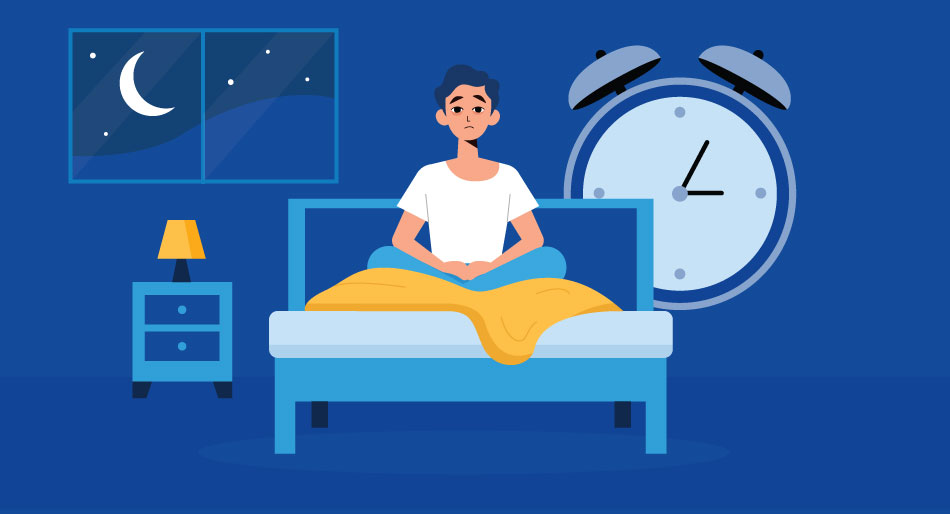Sleep disorders are health conditions that often result in difficulties falling asleep, waking up early, or similar sleep-related issues. To understand the significant causes of sleep disorders, let’s delve into the following article:
Often, the causes of sleep disturbances and awakenings are related to the quality and timing of sleep. These disruptions can lead to functional impairments, particularly during daytime hours.
What Are the Causes of Sleep Disorders?
Various health conditions and diseases can contribute to your experience of sleep disorders. Over time, your sleep disorder may worsen due to underlying health issues.
Here are some of the key contributing factors:
- Allergies and Respiratory Problems: Some types of allergies, colds, and upper respiratory infections can lead to nighttime breathing difficulties. The inability to breathe properly through the nose can result in sleep-related difficulties.
- Frequent Urination: Nocturia, or the need to urinate frequently during the night, can significantly affect your sleep. Hormonal imbalances and urinary tract conditions can sometimes contribute to this condition, making it one of the causes of sleep disturbances.It is essential to consult your healthcare provider promptly if you notice nighttime urination accompanied by bleeding or pain.
- Chronic Pain: Persistent pain can make sleep challenging, as it can wake you up even after you’ve fallen asleep or prevent you from entering deep sleep. Some common causes of chronic pain include:
- Arthritis.
- Chronic fatigue syndrome.
- Inflammatory bowel disease.
- Chronic headaches.
- Severe lower back pain.
- Stress and Anxiety: Continuous feelings of anxiety and stress can be one of the causes of sleep disorders. It can be difficult to fall asleep or stay asleep when something is bothering you.Nightmares, sleep talking, or sleepwalking can also contribute to difficulties in achieving restful sleep.
- Other Causes: Some individuals may experience sleep disorders due to the following health conditions:
- Depression.
- Heart conditions or neurological disorders.
- Genetic factors.
- Side effects of certain medications.
- Excessive consumption of alcoholic beverages and caffeine.
- Low levels of specific chemicals or minerals in the brain.
How to Prevent Sleep Disorders
You can prevent or reduce the risk of experiencing some of the causes of sleep disorders by avoiding the following activities within 3-4 hours before bedtime:
- Beverages with high caffeine content, such as soda, tea, and coffee.
- Tobacco products.
- Alcoholic beverages.
- Napping after 3 PM.
- Chocolate.
- Heavy meals.
Additionally, we recommend following these preventive guidelines to achieve better and more comfortable sleep:
- Include more fruits and vegetables in your diet.
- Make an effort to distance yourself from stress and anxiety-inducing factors.
- Engage in regular physical activity.
- Maintain a consistent sleep schedule.
- Ensure you stay adequately hydrated.
- Maintain a healthy weight based on your healthcare provider’s recommendations.
By implementing these strategies, you can improve your sleep quality and reduce the risk of sleep disorders.
Top 10 Sleep Disorders
Let’s explore the top ten sleep disorders that individuals may encounter:
- Insomnia: Characterized by difficulty falling asleep or staying asleep.
- Sleep Apnea: A condition where breathing repeatedly stops and starts during sleep.
- Narcolepsy: Involuntary episodes of deep sleep, often triggered by strong emotions.
- Restless Legs Syndrome (RLS): Uncontrollable urges to move the legs, often accompanied by uncomfortable sensations.
- Parasomnia: Abnormal behaviors during sleep, such as sleepwalking or night terrors.
- Circadian Rhythm Disorders: Disruptions to the body’s internal clock, leading to irregular sleep patterns.
- Hypersomnia: Excessive daytime sleepiness, causing frequent, long naps.
- Sleep-Related Eating Disorder (SRED): Consuming food while asleep, often unaware of the behavior.
- Bruxism: Teeth grinding during sleep, leading to dental issues and jaw pain.
- Sleep Talking (Somniloquy): Speaking during sleep without being aware of it.
Serious and Rare Sleep Disorders
One of the most severe sleep disorders is Sleep Apnea, as it can lead to significant health risks, including heart problems and high blood pressure. On the other hand, one of the rarest sleep disorders is Sexomnia, a condition where individuals engage in sexual activities during sleep, often without any conscious awareness.
Prevalence of Sleep Disorders in the United States
Sleep disorders are prevalent in the United States, affecting millions of individuals. The most common sleep disorder in the country is Insomnia, followed closely by Sleep Apnea. These disorders can lead to various health issues if left untreated.
Sleep Disorder with the Highest Risk of Death
Among sleep disorders, Sleep Apnea poses the highest risk of death, primarily due to its association with cardiovascular problems and the potential for oxygen deprivation during episodes.
In conclusion, understanding sleep disorders is crucial for maintaining good health. By recognizing their causes, types, and potential risks, individuals can take steps to improve their sleep quality and seek necessary treatment when needed. If you or someone you know is experiencing persistent sleep problems, consulting a healthcare professional is essential to address these issues effectively.
